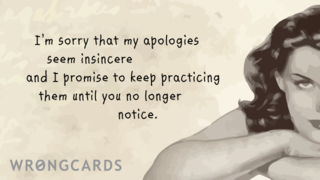The apology problem
Apologies are always difficult. There's always a fine path between the Scylla and Charybdis of saying too little and saying too much (do we really need to know...?. Then there's the question of whether you seem sincere or just mouthing it. There's hundreds of times we've heard people say "I am very sorry if I upset you over this" (carefully not, "I am very sorry to have done this"): good enough or not?
In a way, too much scrutiny of the words is perhaps beside the point. Apologies are rituals, they are a very simple case of "doing things with words". The only thing that actually counts is the audible expression of "I'm sorry" (like "I do" at a wedding). Or are we expecting people to SHOW contrition? And how do we recognise it, in any case. Some people can seem dead truculent and controlled but actually be eaten up inside -- and vice versa.
That is in a way Maria Miller's problem. My guess is that the party spin doctors instructed her to be as brief as possible, on the basis of "give the press any rope and they'll hang you with it", and I might have advised that too if I'd been a spin doctor; wrong call as it turns out. Not that prolixity (so far as I have been able to discover) is the trademark of House of Commons apologies. Nadine Dorries was no longer (even shorter) than Maria Miller, and David Laws a bit longer, but certainly not essay-length (it's the second, shorter one here).
But there are worse sides to public apologies and they can lead in dangerous directions.
I particularly dislike the governmental kind which fulsomely apologise for some dreadful wrong of the past (like slavery or our treatment of the Maori -- or, in the case of the Pope, the death of Galileo). It's not that those things are not terrible wrongs, but a government apology seems too easy a way out. It has all the appearance of a "that's OK then" line being drawn under the issue, and a pretty low cost one too. (Rather like "First Capital Connect apologises for the late running of this train and any inconvenience caused".)
When it's not a simple line being drawn, it can lead to some difficult follow-ups. In the case of Alan Turing, it was followed by a royal pardon for his conviction for gross indecency. Of course, noone would now think that he should have been convicted; so a good case for a pardon, in a way (symbolic as it is, as he's not here to enjoy it). But what about all the other people who were equally wrongly convicted on the same charge, and whose lives were no less ruined by it? Don't they get a pardon too? Not, it seems.
Another case where we think we can rewrite history with the flourish of a pen -- when we should be doing our best to do better than history (in whatever our new injustices may be).
So Maria Miller's apology is part of a more complicated set of issues on that particular score. As for the rest of her case, the husband has been doing his citizenly duty by starting to read the more than 100 pages of the Committee on Standards report on the case, and I have had a peek. Far too soon to say what we think -- except to know already that anyone who pontificates about the rights and wrongs of this particular case, as many seem to be prepared to do, without reading this detailed report are talking through their hats. (Whether we feel, in general, that there is a glaring and unjust disparity between "benefits" for the rich and "benefits" for the poor -- and I do feel that, pretty strongly -- is another matter.)
A very brief glimpse of the complexity, for those without several hours to spare, can be found in this joint statement from the Chair of the Standards Committee and the Commissioner, reacting to some of the press reports.
 newest »
newest »
Mary Beard's Blog
- Mary Beard's profile
- 4110 followers





Is she a tax cheating lying scumbag - Or not?
What is your opinion?
Should she have resigned?
Your loyal readers have a right to know.
Phil